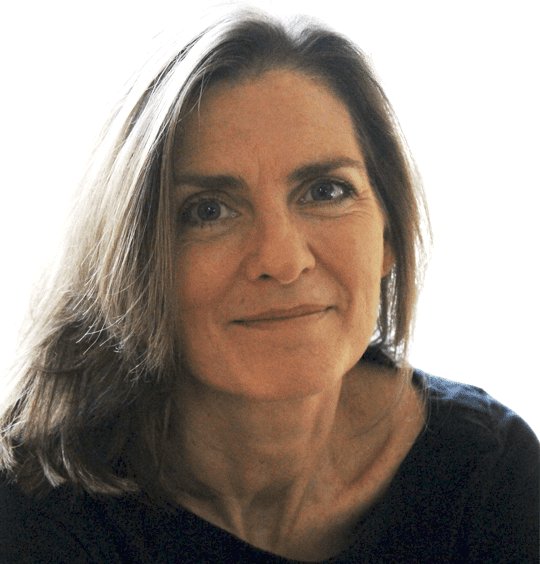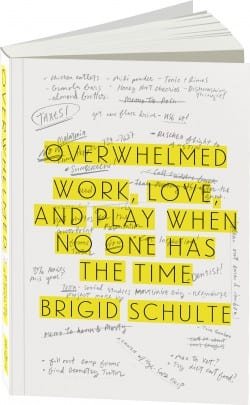Behind-The-Scenes With “Overwhelmed” NYT Bestselling Author
Time Management

I had the good fortune to sit down with Brigid Schulte, a wife, mother, award-winning journalist with The Washington Post and the author of her new book: Overwhelmed: Work, Love, Play, When No One Has The Time.
In this heavily researched book, Schulte takes us on a journey around the world as she uncovers the roots of why we feel so harried and overwhelmed as a culture and what we can do individually and collectively to shift away from the devastating pace at which we are living.
Clearly, I was hooked from the get-go.
Read on to catch a glimpse of what life is like for Brigid on the other side of writing this book – armed with more answers, a different perspective, and the skills to set the pace of her own life.
Julie: What has life been like since your book has come out?
Brigid: To be perfectly honest it has been one of the most exciting and difficult times. People want to talk about the book – it has sparked a conversation – but the additional promotion and publicity has put a demand on my time. I wouldn’t want it any other way though.
So a couple of weeks ago I was feeling overwhelmed, scattered, and fragmented. And I reminded myself that I had learned some skills through the process of writing this book and I just started using them again.
Julie: That is the practice.
Brigid: You get smarter. I don’t get so filled with despair and I beat myself up like I used to because I have been able to do it differently and I’ve seen how other people do it differently.
So what’s nice is that I’ve dropped the judgment and I know that tomorrow is another day. Or even the next moment is another moment.
Julie: I hear self-compassion. I think that is such an important element when shifting the way you approach your time and life. You are letting it be OK who you are and where you are. And OK that it is hard.
Brigid: I think that is one of the most important things I learned in the process of reporting this book. Just how unrealistic the standards are in our culture for what we expect of ourselves. As human beings we all have a sense of not being good enough – it’s a very natural human quality.
This sense can plague you and feed these unrealistic expectations. That is what was happening to me. When you live a mindless life, you are busy and you are running. And you are trying to do your best. You really are trying. And yet sometimes I would stop and say “Who’s life am I living?”
Julie: That is a powerful question for all of us to consider.
Brigid: You are trying to be a crazy ideal worker at work and trying to be a crazy overdoing supermom at home. Trying to keep your house like Martha Stewart.
There are all of these pressures – if you are not grounded and OK with who you are and how you are different and what is important to you – you really get sucked up into. That is a lot of what led me to write the book in the first place.
So even now when there are overwhelming days I don’t feel overwhelmed because I’ve moved and I’m in a different place.
I can see the quality of “never enough” and how I put so many unrealistic expectations on myself. And before when I didn’t see it, I would beat myself up for failing or being inadequate.
That is such a gift that I can see more clearly. I can take a pause and I can be clearer about who I am and the life I am living. I can get clear about what is really important to me.
Julie: One of my favorite parts of the book was when you labeled the “ideal worker”, “ideal mother”, “provider father” and discussed how these cultural norms can run our lives if we are not aware of them.
You also discuss how the lack of corporate and government policies are contributing to our cultural overwhelm. So there are internal and external forces at play. Do we believe we need to focus on one more than the other?
Brigid: I think it is both. You can make the internal shifts and find out what is important to you and yet if you are a part of a workplace culture that values long hours rather than productivity – it is very difficult to maintain these changes on your own. You have to find and create a network of support that will bolster you up.
Julie: I believe there are many people craving a shift in how they live their lives and are willing to walk their own path even if it goes against their company culture or societal norms. For those on the edge and ready to change – where do you suggest they begin?
Brigid: You take a breath. You pause. Go for a walk. Find time to pause regularly. Get to know yourself. Get grounded. Figure out what is most important to you.
Ask yourself: What is the image of the life you want? How do I get from here to there? What is one experiment to try? Start there.
Julie: That’s great. I like to tell people to find a step forward that is laughably doable. Something small enough that moves them the forward but that is also really easy to do. Thank you Brigid for being here today, do you have any final thoughts to share?
Brigid: There is hope. It can be better. We have to work individually and collectively to create these shifts. If we work together we can get there faster.
Here are 3 reasons to grab a copy of Brigid’s book:
- It will help you be less hard on yourself
- It will help you feel less alone in your struggles with overwhelm
- It will help you see the possibilities that exist and what you can do at home and work to shift how overwhelmed you feel

Click here to grab your own copy. And be sure to join in the conversation (and find a host of resources) on Brigid’s blog.
Latest Blog posts
![[Free Meditation] The Dangers Of Self-Improvement](/media/images/Free_Meditation_The_Da.2e16d0ba.format-jpeg.fill-590x300.jpg)
[Free Meditation] The Dangers Of Self-Improvement
How you get into the water is less important than actually being in the water.

Resources For Women With ADHD
I recently sat down with Linda Roggli, PCC, for a quick and informative interview.

10 Hard To Believe (But True) Productivity Statistics
Here are some of my favorite hard to believe productivity statistics that help point out what science has known longer than our society